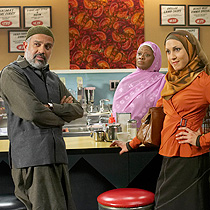 How do you bring a little fun back into fundamentalism? By making a sitcom, as Zarqa Nawaz is fond of saying.
How do you bring a little fun back into fundamentalism? By making a sitcom, as Zarqa Nawaz is fond of saying.
Nawaz is the creator of the new Canadian TV series “Little Mosque on the Prairie.” The show debuted Jan. 9 on CBC TV–to unexpectedly strong ratings–and airs Mondays and Wednesdays at 9 p.m. and 8 p.m., respectively. As the title suggests, “Little Mosque on the Prairie” looks at the small Muslim community in a fictional Canadian prairie town called Mercy.
In the opening episode, we meet Amaar Rashid (Zaib Shaikh), a young lawyer from Toronto on his way to Mercy to follow his true calling–becoming an imam. Except that a cell-phone conversation with his mom–full of references to “suicide” (the career variety), “dropping a bomb” (meaning, the news of his vocational switch), and “Allah’s plan” (ditto)–get him hauled off by the police.
Meanwhile, in Mercy, the local Muslims are getting tired of the old imam, Baber Siddiqui (Manoj Sood), who rails that liquorice, wine, gum, and rye bread are Western traps to seduce Muslims to drink alcohol. The community can’t wait for the new imam to lead the congregation.
They’re also fighting other battles between the old guard and the new. While Baber wants to use a Costco telescope to sight the moon to mark the beginning of Ramadan, the more secular Yasir Hamoudi suggests checking out the website moonsighting.org to “let the starvation begin.” Similarly, Yasir’s wife, Sarah Hamoudi (Sheila McCarthy), who converted to Islam, would like to serve up cucumber sandwiches to break the fast, but she squares off with the traditional goat curry dished out by Fatima Dinssa (Arlene Duncan).
The aim was not to make a socio-political show, Nawaz says in an interview, but to make a good comedy. As a sitcom, the show has to deliver its laughs to get its high ratings, otherwise it will get cancelled, she points out.
“You can’t please everyone,” says Nawaz, when questioned about the criticism she’s received. “I’m just a comedy writer. I am not making a giant social statement. Ray Romano wrote about his elder brother who lived with parents. This show’s about everyday Muslim people, who live in the prairies.”
Nawaz whispers as she talks. She doesn’t want to disturb the scenes being shot in the ‘diner’ stage of the set, so the interview is being conducted in the ‘mosque’ stage. A hockey baseboard with the worn-out lettering spelling “Mercy Midgets” is near the back.
“That’s the barrier the mosque puts up,” Nawaz explains the plot of the second episode of the show. “They just use some scrap piece of wood.”
Much of “Little Mosque on the Prairie” draws from Nawaz’s own fish-out-of-water experiences moving from Toronto to Regina, Saskatchewan. A filmmaker who has made several comedic shorts, including “BBQ Muslims” and “Death Threat,” Nawaz hit upon the idea of “Little Mosque on the Prairie” when she was making her documentary “Me and the Mosque.”
When a barrier to divide men and women was established in the little Regina mosque that Nawaz attended, she traveled across Canada and spoke with scholars and lay people about the issue. During the process, she wondered what would a mosque led by a second-generation Muslim Canadian imam look like.
“Serious subjects make great fodder for comedy,” says Nawaz. “The world is getting a little bit crazier. We have to find humor in the situation to be able to deal with it.”
Some of the series’ humor comes from quintessential Canadiana, such as the way Torontonians are disliked in other parts of the country. On the other hand, there is also equal opportunity for stereotype ribbing: the right-wing radio talk show host Fred Tupper is as much a source of amusement as the extremist old-school imam Baber.
While the show proposes to find comedy in the quirks of our–in this case many Muslims’–everyday lives, the debut episode depended more on clever writing. The punning zingers, making ‘a big meal out of’ the iftar feast, for instance–were sometimes wearisome. Teasers of upcoming episodes suggest the punning will continue: In one episode a rebellious teenager tries the tactic of “shop and awe” against her father, Baber.
As for the actors, a few of them seem daunted by the show’s unusual premise, and are far too earnest in portraying their characters. That may well be first-show jitters or a result of the unbelievable buzz about “Little Mosque on the Prairie.” After all, the show had been covered by national and international media, even before it aired.
The reactions to the show have been mixed–ranging from lauding it as a truly Canadian show revelling in multiculturalism, to dismaying at the show’s (uniquely Canadian) political correctness.
The first episode drew 2.1 million viewers. Will it keep up the numbers, and bring a little fun back in fundamentalism? Only the TV seasons can tell.
— Posted by Aparita Bhandari


